Accelerate > Publications
Search this online library featuring the latest FAO publications, issue papers and briefs which offer up-to-date knowledge and innovative insights for SDG acceleration.

Transforming public agricultural extension and advisory service systems in smallholder farming - Status quo, gaps, way forward
2022
Worldwide, extension and advisory service (EAS) systems have undergone reforms since the 1990s. However, the reforms of the last two decades in many countries have largely failed, as there has not been significant increase in accountability, efficiency, empowerment or impact. To fill this gap, this document, based on a systematic and extended literature review, delves into public EAS systems in developing countries, with a special focus on smallholder farming and institutional reforms.
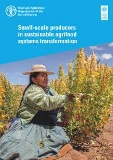
Small-scale producers in sustainable agrifood systems transformation
2022
This paper analyzes the diversity of small-scale producers and demonstrates how understanding small-scale production can have consequences for how policies and investments are directed and how they impact small-scale producer livelihoods. The diverse roles and functions of small-scale production are presented as being essential to realizing sustainable agrifood systems transformations and respecting its social, environmental and economic dimensions.
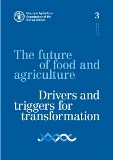
The future of food and agriculture – Drivers and triggers for transformation
2022
This report aims at inspiring strategic thinking and actions to transform agrifood systems towards a sustainable, resilient and inclusive future, by building on both previous reports in the same series as well as on a comprehensive corporate strategic foresight exercise that also nurtured FAO Strategic Framework 2022–31. It analyses major drivers of agrifood systems and explores how their trends could determine alternative futures of agrifood, socioeconomic and environmental systems.
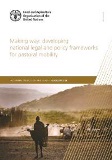
Making way - developing national legal and policy frameworks for pastoral mobility
2022
This handbook calls for the legal recognition and securing of pastoral mobility as a way of safeguarding and facilitating a continuous stream of economic and social benefits for pastoralists, countries, and the environment. It facilitates a deeper understanding of pastoral mobility through examples and case studies drawn from various parts of the world and identifies considerations to be borne in mind when legislating for mobility.

FAO’s work on South–South and Triangular Cooperation in sub-Saharan Africa: Exchanging rice-farming knowledge and technology for food security
2022
FAO has worked with a range of partners on successful South–South and Triangular Cooperation agreements to benefit Africa, including Brazil, China, the Republic of Korea, Morocco, the Bolivarian Republic of Venezuela and Viet Nam. These Global South partners bring considerable knowledge and experience borne from decades of national development progress and international development assistance. Their cooperation embodies solidarity among peoples and countries of the Global South.
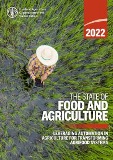
The State of Food and Agriculture 2022 - Leveraging agricultural automation for transforming agrifood systems
2022
The State of Food and Agriculture 2022 looks into the drivers of agricultural automation, including the more recent digital technologies. Based on 27 case studies, the report analyses the business case for adoption of digital automation technologies in different agricultural production systems across the world. It identifies several barriers preventing inclusive adoption of these technologies, particularly by small-scale producers.
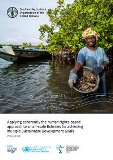
Applying coherently the human rights framework to small-scale fisheries for achieving multiple Sustainable Development Goals
2022
In the context of the International Year of Artisanal Fisheries and Aquaculture 2022, FAO, the Office of the High Commissioner for Human Rights (OHCHR) and the collaborative research initiative One Ocean Hub have been collaborating to raise awareness of the full scope of the human rights framework applicable to small-scale fisheries. This policy brief aims to clarify the scope of the international human rights framework, including the corresponding State obligations...
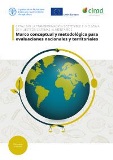
Catalysing the sustainable and inclusive transformation of food systems
2022
Food systems are intimately linked to our lives – through the food we eat, our nutrition and health, our livelihoods, jobs, and the environment and natural resources of the planet. The main challenge for food systems is to produce nutritious food for all while preserving our biodiversity and environment and ensuring equitable distribution of wealth. This brief provides a summarized version of the methodology used to conduct a global assessment of food systems in over 50 countries ...
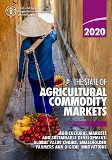
The State of Agricultural Commodity Markets 2020 - Agricultural markets and sustainable development: Global value chains, smallholder farmers and digital innovations
2020
The State of Agricultural Commodity Markets 2020 (SOCO 2020) aims to discuss policies and mechanisms that promote sustainable outcomes – economic, social and environmental – in agricultural and food markets, both global and domestic. The analysis is organized along the trends and challenges that lie at the heart of global discussions on trade and development.
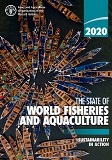
The State of World Fisheries and Aquaculture 2020 - Sustainability in action
2020
The 2020 edition of The State of World Fisheries and Aquaculture has a particular focus on sustainability. This reflects a number of specific considerations. First, 2020 marks the twenty-fifth anniversary of the Code of Conduct for Responsible Fisheries (the Code). Second, several Sustainable Development Goal indicators mature in 2020...
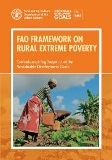
FAO framework on rural extreme poverty: Towards reaching Target 1.1 of the Sustainable Development Goals
2019
FAO has established a Corporate Framework on Rural Extreme Poverty to orient and bring to bear the relevant work of the Organization towards reaching Target 1.1 of the SDGs. Eliminating extreme poverty is directly linked to eliminating hunger (SDG 2), as well as other SDGs. When the extreme poor have means to a better life, they no longer suffer from hunger and can invest in a better future for their families and communities

The State of World Fisheries and Aquaculture 2018 - Meeting the sustainable development goals
2018
The 2018 edition of The State of World Fisheries and Aquaculture emphasizes the sector’s role in achieving the 2030 Agenda for Sustainable Development and the Sustainable Development Goals, and measurement of progress towards these goals. It notes the particular contributions of inland and small-scale fisheries, and highlights the importance of rights-based governance for equitable and inclusive development.
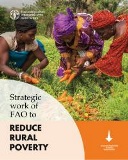
Strategic work of FAO to reduce rural poverty
2017
FAO helps countries achieve SDG1 (No poverty) and SDG2 (Zero hunger) by improving the livelihoods of poor and extreme poor rural people, including smallholders and family farmers.
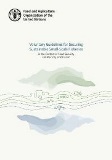
Voluntary Guidelines for Securing Sustainable Small-Scale Fisheries in the Context of Food Security and Poverty Eradication
2015
The Voluntary Guidelines for Securing Sustainable Small-Scale Fisheries in the Context of Food Security and Poverty Eradication (SSF Guidelines) represent the first ever international instrument dedicated to small-scale fisheries. They represent a global consensus on principles and guidance for small-scale fisheries governance and development.
Browse by SDG
- SDG1: No Poverty
- SDG2: Zero Hunger
- SDG3: Good Health & Well-being
- SDG4: Quality Education
- SDG5: Gender Equality
- SDG6: Clean Water & Sanitation
- SDG7: Affordable and Clean Energy
- SDG8: Decent Work and Economic Growth
- SDG9: Industry, Innovation and Infrastructure
- SDG10: Reduced Inequalities
- SDG11: Sustainable Cities and Communities
- SDG12: Responsible Consumption and Production
- SDG13: Climate Action
- SDG14: Life Below Water
- SDG15: Life on Land
- SDG16: Peace, Justice and Strong Institutions
- SDG17: Partnerships for the Goals
Browse by Better
Browse by Priority Area
- Innovation for Sustainable Agriculture Production
- Blue Transformation
- One Health
- Small-Scale Producers' Equitable Access to Resources
- Digital Agriculture
- Healthy Diets for All
- Nutrition for the Most Vulnerable
- Safe Food for Everyone
- Reducing Food Loss and Waste
- Transparent Markets and Trade
- Climate Change Mitigating and Adapted Agrifood Systems
- Bioeconomy for Sustainable Food and Agriculture
- Biodiversity and Ecosystem Services for Food and Agriculture
- Achieving Sustainable Urban Food Systems
- Gender Equality and Rural Women's Empowerment
- Inclusive Rural Transformation
- Agriculture and Food Emergencies
- Resilient Agrifood Systems
- Hand-in-Hand Initiative
- Scaling up Investment
